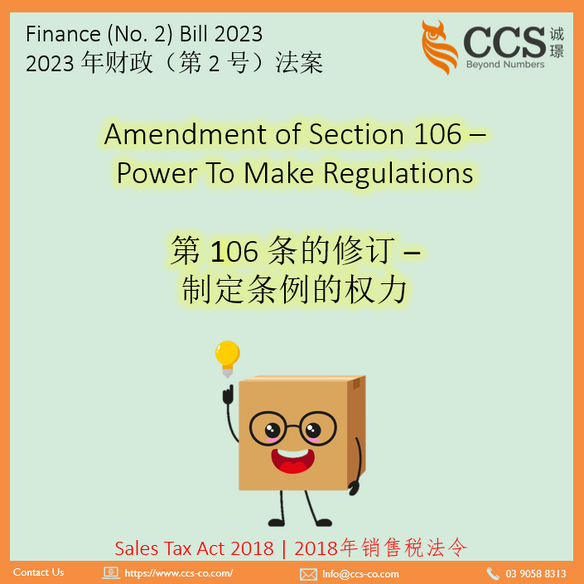“Section 106 – Power To Make Regulations” is read as follows:-
106(1) The Minister may make regulations as may be necessary or expedient for the purposes of carrying into effect the provisions of this Act.
106(2) Without prejudice to the generality of subsection (1), the Minister may prescribe—
- all matters relating to registration of manufacturers and sellers;
- all matters relating to taxable period;
- all matters relating to determination of sale value of the taxable goods and low value goods;
- all matters relating to furnishing of returns and payment of sales tax;
- all matters relating to refund, drawback and remission of sales tax;
- all matters relating to public ruling and customs ruling;
- all matters relating to electronic service;
- all matters relating to invoices, credit notes and debit notes;
- all matters relating to the offices for the administration of sales tax;
- all fees required by this Act to be prescribed;
- all forms to be prescribed for the purposes of this Act;
(ka) all matters relating to low value goods;
(l) all matters relating to petroleum; or
(m) any other matters required by this Act to be prescribed.
106(3) Any regulations made under subsection (1) may prescribe an act or omission in contravention of the regulations to be an offence and may prescribe penalties of a fine not exceeding thirty thousand ringgit or to imprisonment for a term not exceeding two years or to both for such offence.
Section 106 grants the Minister the authority to establish regulations necessary for implementing the provisions of the Sales Tax Act.
These regulations cover a wide range of aspects, including registration, taxable periods, determination of sale value, returns and payment, refund procedures, public and customs rulings, electronic services, fees, prescribed forms, matters related to low-value goods, petroleum, and other aspects required by the Act.
Finance (No. 2) Bill 2023
Amendment Explanation:
The proposed amendment involves the removal of paragraph 106(2)(k) from the list of matters that the Minister may prescribe regulations for.
This implies a change in the scope of regulatory authority, specifically in the area related to “forms to be prescribed for the purposes of this Act.”


Tax Impact:
The change from “in the form and manner as determined by the Minister” to “in the form and manner as determined by the Director General” represents a shift in the authority responsible for determining the specifics of certain procedures under the Sales Tax Act. This amendment grants more direct control and decision-making power to the Director General rather than the Minister.
As an administrative position within the tax authority, the Director General is likely to have a closer and more practical understanding of the day-to-day operational needs and requirements of the Sales Tax Act. This change can facilitate a more responsive and efficient adaptation of forms and procedures to evolving circumstances or practical considerations.
It is important to note that such shifts in decision-making authority can influence the agility and responsiveness of the regulatory framework, potentially streamlining processes and allowing for more targeted and timely adjustments as needed. However, the exact implications would depend on how the Director General exercises this authority and the specific details of the forms and procedures in question.








